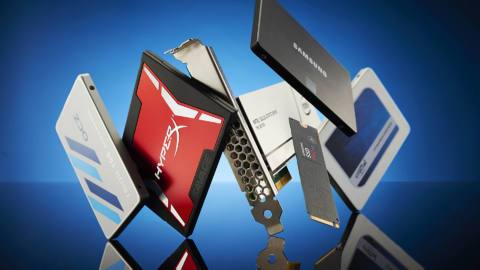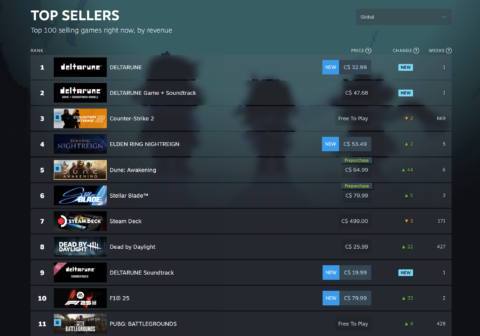PCIe 5.0 SSDs haven't quite taken off yet, especially for PC gaming. But the winds might soon change as Samsung's just started producing some incredibly fast and supposedly very efficient PCIe 5 SSDs.
Samsung's PM9E1 (via TechPowerUp) is said to reach up to a whopping 14.5 GB/s sequential read and 13.5 GB/s sequential write speeds. For reference, its PCIe 4.0 predecessor has read and write speeds of 7 GB/s and 5.1 GB/s, respectively, which is why Samsung claims double the speed for this new one.
Also for reference, most fast PCIe 5.0 SSDs today max out at about 12 GB/s read and 10 GB/s write speeds, and standard ones max out lower than this. The current fastest PCIe 5.0 SSD apart from this new PM9E1 is the Crucial T705, which has the same 14.5 GB/s read speed but a slower 12,700 MB/s write speed.
With this SSD, then, Samsung really will have a claim to creating the industry's fastest consumer SSD. Which is quite a feat for a company that's barely stepped foot into the PCIe 5.0 market, currently having just one retailing in the form of the 990 Evo.
In fact, we might as well consider the PM9E1 the company's first PCIe 5.0 SSD, given the 990 Evo isn't a proper PCIe 5.0 SSD. The 990 Evo runs at 5.0 2×2 speed and this is, for all intents and purposes, the same as running a PCIe 4.0 SSD over 4×4 lanes. The PM9E1, however, should run at true PCIe Gen 5 bandwidth.
The PM9E1 will likely be a more manufacturer-focused drive for OEMs, with those drives going into pre-builts and workstations, while a consumer-focused drive featuring the new Samsung controller will likely follow this with more of a fancy naming scheme.
The thing is, none of this means anything if it's unattainably expensive or unreasonably hot, which is the main problem with PCIe 5.0 SSDs across the board and why almost all of our recommendations for the best SSDs for gaming are PCIe 4.0 drives.

Best SSD for gaming: The best speedy storage today.
Best NVMe SSD: Compact M.2 drives.
Best external hard drives: Huge capacities for less.
Best external SSDs: Plug-in storage upgrades.
That, and the fact that sequential reads and writes don't really mean much if those speeds are limited by the lowest common denominator, which will be whatever you're transferring from or to. And as it stands, current PCIe 5.0 4k random read and write speeds are barely improved at all, which is the main kicker given that this is what affects one's general desktop and gaming experience.
On the other hand, the PM9E1 is said to have power efficiency improvements of over 50%, no doubt thanks to its new in-house 5 nm controller. If Samsung kicks the PCIe 5.0 controller game into some semblance of reasonableness—meaning it makes SSDs with controllers that don't require stacks of active cooling to run—that would be promising. It might even make for PCIe 5.0 SSDs that can fit inside laptops and handhelds.
Perhaps this could signal the start of actually usable PCIe 5.0 SSDs, just in time for the new platforms that can really make use of them. Some x870 motherboards, for example, support up the three Gen 5 SSDs, and Z890 motherboards are rumoured to have more PCIe 5.0 lanes than you can shake a very long NVMe drive at.
So, while PCIe 5.0 still isn't worth it for PC gaming, this Samsung drive might signal that this is beginning to change, meaning PCIe 5.0 drives aren't worth it right now but soon might be.
Which would make sense, given the new AMD and Intel platforms, not to mention the onset of AI-era computing where NPUs and LLMs might make good use of faster drives. Let's just hope any general SSD progress rises the gaming tides, too.






